中考英语语法专题讲解——时态课件(31张PPT)
文档属性
| 名称 | 中考英语语法专题讲解——时态课件(31张PPT) |

|
|
| 格式 | zip | ||
| 文件大小 | 1.6MB | ||
| 资源类型 | 教案 | ||
| 版本资源 | 通用版 | ||
| 科目 | 英语 | ||
| 更新时间 | 2019-10-01 00:00:00 | ||
图片预览


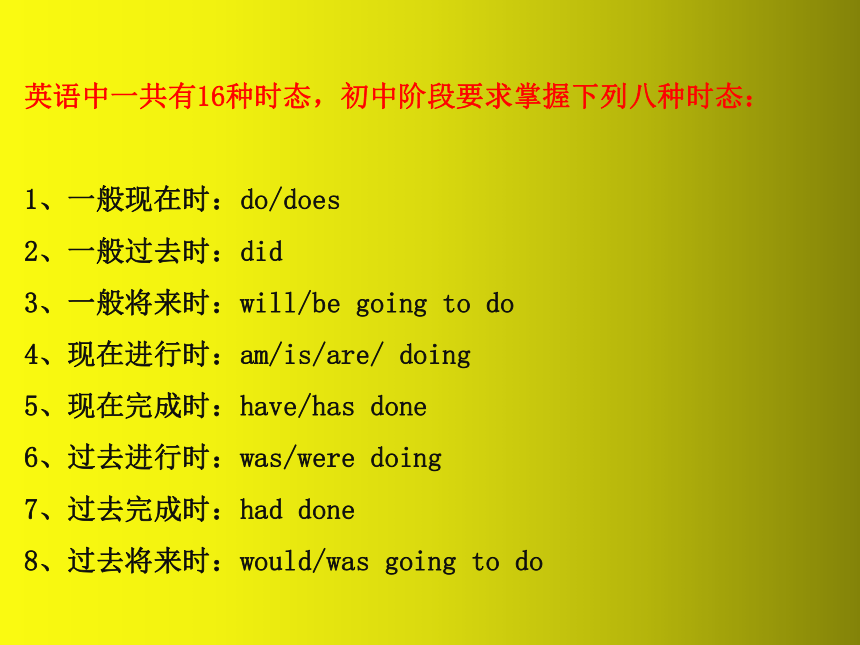

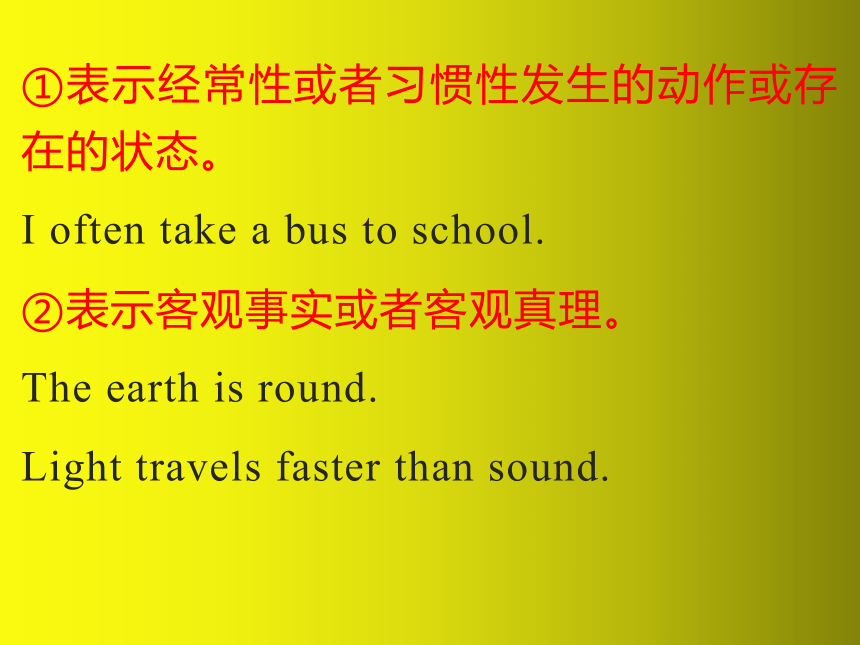
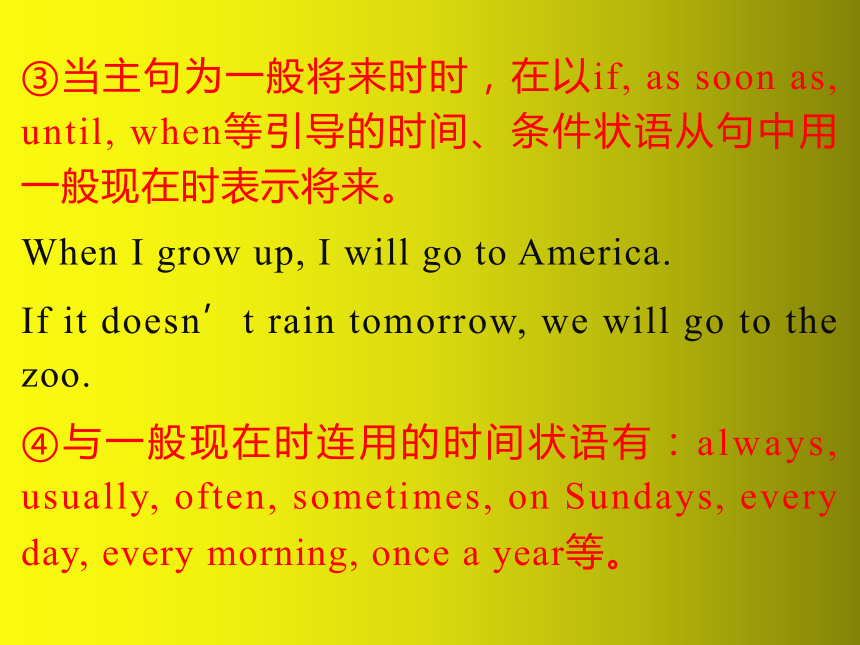

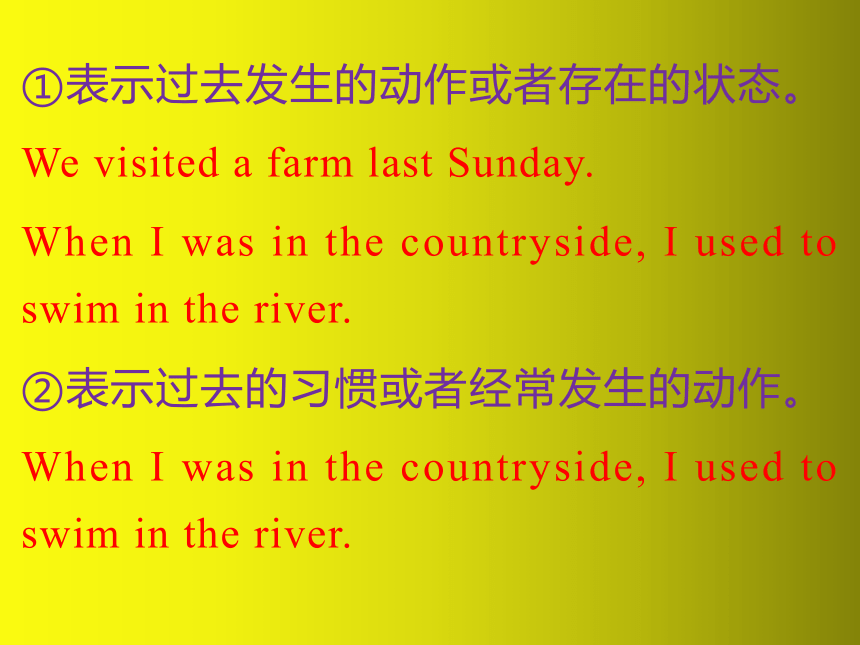
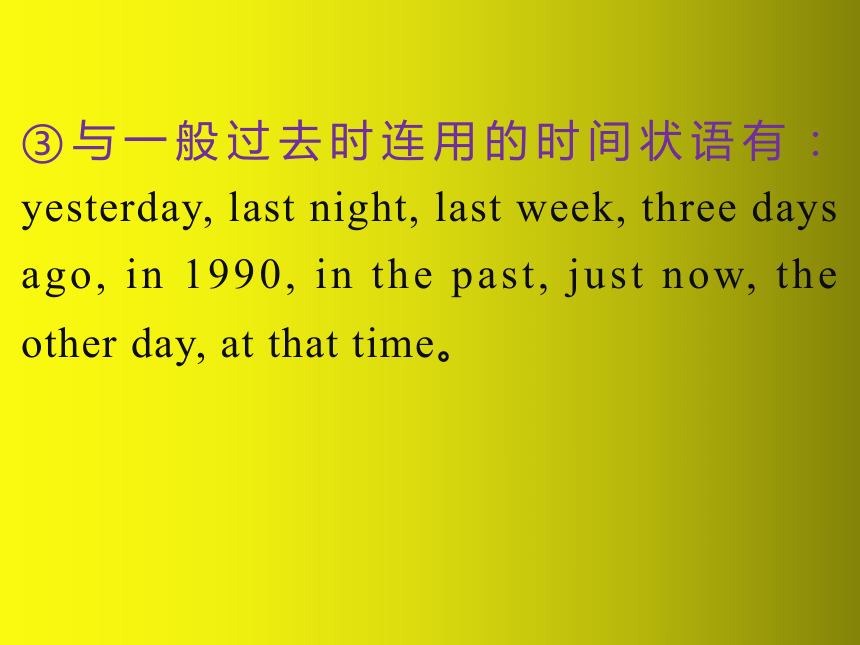
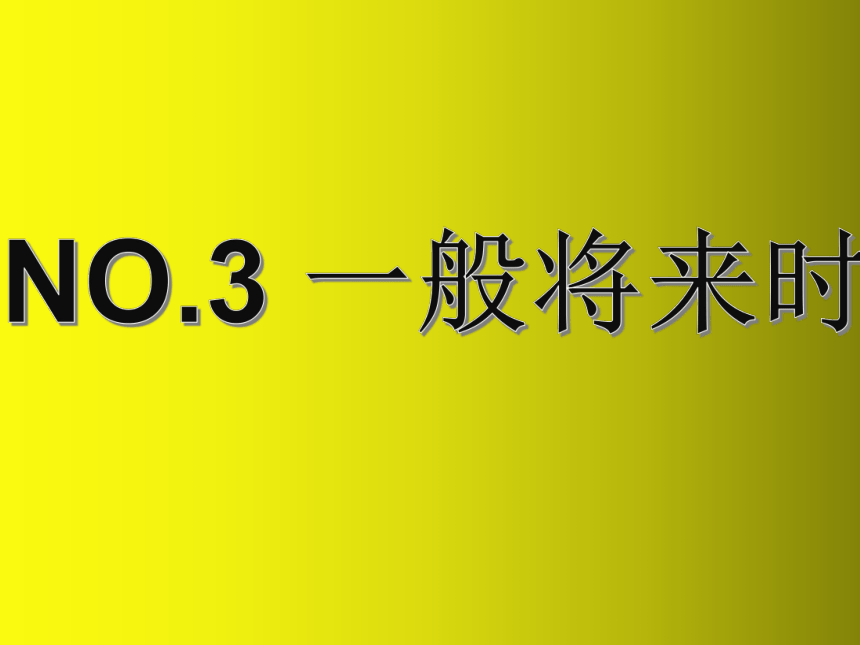

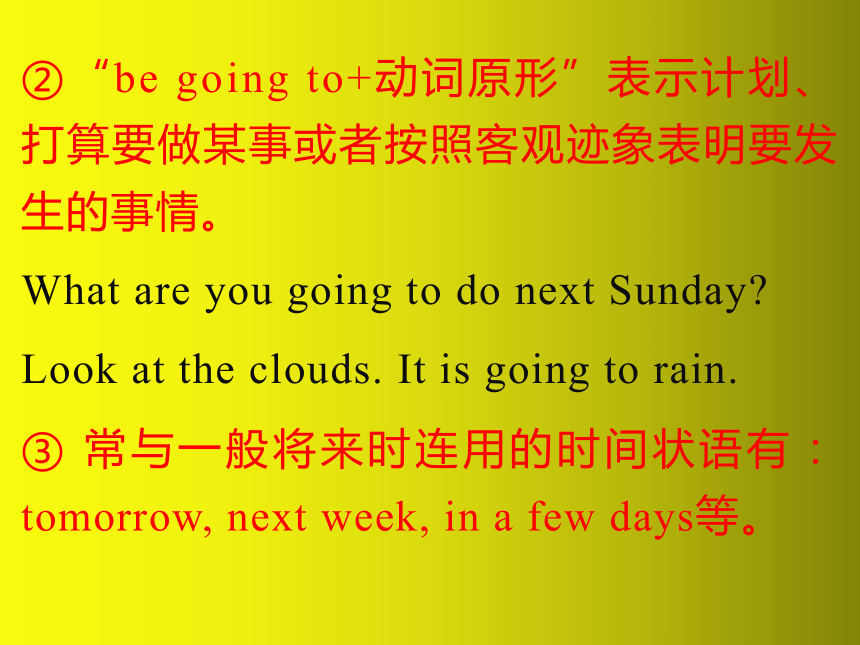
文档简介
(共31张PPT)
中考英语语法专题讲解——时态
英语中一共有16种时态,初中阶段要求掌握下列八种时态:
1、一般现在时:do/does
2、一般过去时:did
3、一般将来时:will/be going to do
4、现在进行时:am/is/are/ doing
5、现在完成时:have/has done
6、过去进行时:was/were doing
7、过去完成时:had done
8、过去将来时:would/was going to do
①表示经常性或者习惯性发生的动作或存在的状态。
I often take a bus to school.
②表示客观事实或者客观真理。
The earth is round.
Light travels faster than sound.
③当主句为一般将来时时,在以if, as soon as, until, when等引导的时间、条件状语从句中用一般现在时表示将来。
When I grow up, I will go to America.
If it doesn’t rain tomorrow, we will go to the zoo.
④与一般现在时连用的时间状语有:always, usually, often, sometimes, on Sundays, every day, every morning, once a year等。
①表示过去发生的动作或者存在的状态。
We visited a farm last Sunday.
When I was in the countryside, I used to swim in the river.
②表示过去的习惯或者经常发生的动作。
When I was in the countryside, I used to swim in the river.
③与一般过去时连用的时间状语有:yesterday, last night, last week, three days ago, in 1990, in the past, just now, the other day, at that time。
①表示将来发生的动作或者存在的状态,结构为:will/shall+动词原形,will用于所有人称,shall只用于第一人称表示征求对方意见。
Will you be back in two days?
Where shall we meet tomorrow?
注意:“will+动词原形”还可以表示愿意做某事或者客观性的将来。
We will help him if he asks us.
The sun will rise at 6:00 tomorrow morning.
②“be going to+动词原形”表示计划、打算要做某事或者按照客观迹象表明要发生的事情。
What are you going to do next Sunday?
Look at the clouds. It is going to rain.
③ 常与一般将来时连用的时间状语有:tomorrow, next week, in a few days等。
①表示现在或者现阶段正在进行的动作或持续的状态。
They are singing in the next room now.
The students are working on the farm these days.
②现在进行时表示将来的动作,这种结构的动词有:go, come, start, begin, arrive, leave等,表示即将发生的动作或者安排好要做的事情。
We are leaving for Shanghai.
The bus is coming soon.
③ 常与现在进行时连用的时间状语和标志词有:now, these days, look, listen等。
①表示发生在过去的或已经完成的对现在仍有影响的动作。
I have lost my key.
I have already seen the film.
②表示一个动作或者状态发生在过去,并持续到现在,可能还要持续下去,常和“for+时间段”或者“since+时间点/从句”连用,这时只能用延续性动词。
Mr. Zhang has taught English for 20 years.
③几个副词在现在完成时中的用法
just意为“刚刚”,表示动作刚刚结束,常放在助动词与过去分词之间。
He has just come back from America.
ever意为“曾经”,用于疑问句和否定句中,放在助动词和过去分词之间。
Have you ever been to London?
never意为“从来没有”,常与before连用,放在助动词和过去分词之间。
I have never been to Beijing before.
before意为“以前”,指过去不确定的某个时候,总放在句末。
I have never heard of this singer before.
④延续性动词和非延续性动词在现在完成时中的用法
现在完成时可表示动作从过去某个时候开始一直持续到现在,与一段时间连用时谓语动词必须是延续性动词,非延续动词不能和一段时间连用。
我离开家乡已有10年了。
误:I have left my hometown for 10 years.
正:I have been away from my hometown for 10 years.
常见的非延续性动词变为延续性动词
buy→have borrow→keep
open→be open close→be closed
begin/start→be on come→be her
go→be there die→be dead
catch a cold→have a cold
fall asleep→be asleep
join→be in/be a member of
leave→be away
常与现在进行时连用的时间状语有:already, yet, never, ever, just, so far, up to now, until now, by now, in the past/last few years, for+一段时间,since+时间点/从句。
① 表示过去某一时刻或者一段时间正在进行的动作,常和表示过去的时间状语连用如then, at that time, this time yesterday, at ten yesterday。
I was reading when my mother came in.
② 过去进行时常用于when和while引导的时间状语从句的主从复合句中。
When the teacher came in, we were talking loudly.
While the family were having dinner, the doorbell rang.
③ go, come, leave, arrive, start等动词的过去进行时表示过去按计划即将发生的动作。
①过去将来时表示从过去某一时间看将要发生的动作或存在的状态,常用在宾语从句中,结构为“would+动词原形”。
He asked when the meeting would start.
②用“was/were going to+动词原形”表示过去曾经打算或准备要做的事情。
He was going to start a new job when I saw him then.
①过去完成时指的是到过去某个时间为止已经完成的动作或者状态,简单地说就是“过去的过去”。过去完成时在句中使用时一般必须有一个或暗含一个发生在过去的动作作为参照,使用过去完成时的动词动作发生在过去动作之前。
He had finished his homework before he went to bed.
②常与过去完成时连用的时间状语有:by last week, by the end of last year。
Just as I got to the school gate, I realized I had left my book in the cafe.
难点突破
一、现在完成时和一般过去时的区别
方面 时态 意义及用法区别
侧重点不同
现在完成时 与现在有关的时态,属于现在时间范畴,侧重过去发生的动作对现在造成的影响
一般过去时 是一种过去时态,侧重于表示过去的动作,与现在无关
时间状语不同
现在完成时 already, yet, just, so far, until now, up to now, by now, ever, never, before, in the past/last few years, for, since
一般过去时 ...ago, yesterday, last..., just now, in 1990
二、have been to, have gone to和have been in的区别
1、have been in 表示“在某地(多长时间)”,常与表示一段时间的状语连用。
Mr. Brown has been in Shanghai for three days. 布朗来上海已经有三天了。
They have been in Canada for five years. 他们到加拿大有五年了。
2、have been to表示“曾经去过某地”,现在已经不在那里了,可与just, ever, never等连用。
Mary has never been to the Great Wall. 玛丽从未去过长城。
They have been to that village several times. 他们去过那个村庄好几次了。
3、have gone(to)表示“ 到某地去了”,表示到了某地或正在去某地的途中。总之,说话时该人不在现场,常用于第三人称。
---Where is Tom? 汤姆在哪里?
---He has gone to the bookshop. 他到书店去了。
三、一般过去时和过去进行时的区别
时态 意义及用法 举例
一般过去时 一般来说,强调过去某个时间或者某段时间曾有过某个(已完成)的动作 I wrote a letter yesterday evening.
过去进行时 强调动作在过去某个时间或某段时间内正在进行 I was writing a letter yesterday evening.
中考英语语法专题讲解——时态
英语中一共有16种时态,初中阶段要求掌握下列八种时态:
1、一般现在时:do/does
2、一般过去时:did
3、一般将来时:will/be going to do
4、现在进行时:am/is/are/ doing
5、现在完成时:have/has done
6、过去进行时:was/were doing
7、过去完成时:had done
8、过去将来时:would/was going to do
①表示经常性或者习惯性发生的动作或存在的状态。
I often take a bus to school.
②表示客观事实或者客观真理。
The earth is round.
Light travels faster than sound.
③当主句为一般将来时时,在以if, as soon as, until, when等引导的时间、条件状语从句中用一般现在时表示将来。
When I grow up, I will go to America.
If it doesn’t rain tomorrow, we will go to the zoo.
④与一般现在时连用的时间状语有:always, usually, often, sometimes, on Sundays, every day, every morning, once a year等。
①表示过去发生的动作或者存在的状态。
We visited a farm last Sunday.
When I was in the countryside, I used to swim in the river.
②表示过去的习惯或者经常发生的动作。
When I was in the countryside, I used to swim in the river.
③与一般过去时连用的时间状语有:yesterday, last night, last week, three days ago, in 1990, in the past, just now, the other day, at that time。
①表示将来发生的动作或者存在的状态,结构为:will/shall+动词原形,will用于所有人称,shall只用于第一人称表示征求对方意见。
Will you be back in two days?
Where shall we meet tomorrow?
注意:“will+动词原形”还可以表示愿意做某事或者客观性的将来。
We will help him if he asks us.
The sun will rise at 6:00 tomorrow morning.
②“be going to+动词原形”表示计划、打算要做某事或者按照客观迹象表明要发生的事情。
What are you going to do next Sunday?
Look at the clouds. It is going to rain.
③ 常与一般将来时连用的时间状语有:tomorrow, next week, in a few days等。
①表示现在或者现阶段正在进行的动作或持续的状态。
They are singing in the next room now.
The students are working on the farm these days.
②现在进行时表示将来的动作,这种结构的动词有:go, come, start, begin, arrive, leave等,表示即将发生的动作或者安排好要做的事情。
We are leaving for Shanghai.
The bus is coming soon.
③ 常与现在进行时连用的时间状语和标志词有:now, these days, look, listen等。
①表示发生在过去的或已经完成的对现在仍有影响的动作。
I have lost my key.
I have already seen the film.
②表示一个动作或者状态发生在过去,并持续到现在,可能还要持续下去,常和“for+时间段”或者“since+时间点/从句”连用,这时只能用延续性动词。
Mr. Zhang has taught English for 20 years.
③几个副词在现在完成时中的用法
just意为“刚刚”,表示动作刚刚结束,常放在助动词与过去分词之间。
He has just come back from America.
ever意为“曾经”,用于疑问句和否定句中,放在助动词和过去分词之间。
Have you ever been to London?
never意为“从来没有”,常与before连用,放在助动词和过去分词之间。
I have never been to Beijing before.
before意为“以前”,指过去不确定的某个时候,总放在句末。
I have never heard of this singer before.
④延续性动词和非延续性动词在现在完成时中的用法
现在完成时可表示动作从过去某个时候开始一直持续到现在,与一段时间连用时谓语动词必须是延续性动词,非延续动词不能和一段时间连用。
我离开家乡已有10年了。
误:I have left my hometown for 10 years.
正:I have been away from my hometown for 10 years.
常见的非延续性动词变为延续性动词
buy→have borrow→keep
open→be open close→be closed
begin/start→be on come→be her
go→be there die→be dead
catch a cold→have a cold
fall asleep→be asleep
join→be in/be a member of
leave→be away
常与现在进行时连用的时间状语有:already, yet, never, ever, just, so far, up to now, until now, by now, in the past/last few years, for+一段时间,since+时间点/从句。
① 表示过去某一时刻或者一段时间正在进行的动作,常和表示过去的时间状语连用如then, at that time, this time yesterday, at ten yesterday。
I was reading when my mother came in.
② 过去进行时常用于when和while引导的时间状语从句的主从复合句中。
When the teacher came in, we were talking loudly.
While the family were having dinner, the doorbell rang.
③ go, come, leave, arrive, start等动词的过去进行时表示过去按计划即将发生的动作。
①过去将来时表示从过去某一时间看将要发生的动作或存在的状态,常用在宾语从句中,结构为“would+动词原形”。
He asked when the meeting would start.
②用“was/were going to+动词原形”表示过去曾经打算或准备要做的事情。
He was going to start a new job when I saw him then.
①过去完成时指的是到过去某个时间为止已经完成的动作或者状态,简单地说就是“过去的过去”。过去完成时在句中使用时一般必须有一个或暗含一个发生在过去的动作作为参照,使用过去完成时的动词动作发生在过去动作之前。
He had finished his homework before he went to bed.
②常与过去完成时连用的时间状语有:by last week, by the end of last year。
Just as I got to the school gate, I realized I had left my book in the cafe.
难点突破
一、现在完成时和一般过去时的区别
方面 时态 意义及用法区别
侧重点不同
现在完成时 与现在有关的时态,属于现在时间范畴,侧重过去发生的动作对现在造成的影响
一般过去时 是一种过去时态,侧重于表示过去的动作,与现在无关
时间状语不同
现在完成时 already, yet, just, so far, until now, up to now, by now, ever, never, before, in the past/last few years, for, since
一般过去时 ...ago, yesterday, last..., just now, in 1990
二、have been to, have gone to和have been in的区别
1、have been in 表示“在某地(多长时间)”,常与表示一段时间的状语连用。
Mr. Brown has been in Shanghai for three days. 布朗来上海已经有三天了。
They have been in Canada for five years. 他们到加拿大有五年了。
2、have been to表示“曾经去过某地”,现在已经不在那里了,可与just, ever, never等连用。
Mary has never been to the Great Wall. 玛丽从未去过长城。
They have been to that village several times. 他们去过那个村庄好几次了。
3、have gone(to)表示“ 到某地去了”,表示到了某地或正在去某地的途中。总之,说话时该人不在现场,常用于第三人称。
---Where is Tom? 汤姆在哪里?
---He has gone to the bookshop. 他到书店去了。
三、一般过去时和过去进行时的区别
时态 意义及用法 举例
一般过去时 一般来说,强调过去某个时间或者某段时间曾有过某个(已完成)的动作 I wrote a letter yesterday evening.
过去进行时 强调动作在过去某个时间或某段时间内正在进行 I was writing a letter yesterday evening.
同课章节目录
- 词法
- 名词
- 动词和动词短语
- 动词语态
- 动词时态
- 助动词和情态动词
- 非谓语动词
- 冠词
- 代词
- 数词和量词
- 形容词副词及其比较等级
- 介词和介词短语
- 连词和感叹词
- 构词法
- 相似、相近词比较
- 句法
- 陈述句
- 一般疑问句和否定疑问句
- 特殊疑问句及选择疑问句
- 反意疑问句
- 存在句(There be句型)
- 宾语从句
- 定语从句
- 状语从句
- 主谓一致问题
- 简单句
- 并列句
- 复合句
- 主谓一致
- 主、表语从句
- 名词性从句
- 直接引语和间接引语
- 虚拟语气
- 感叹句
- 强调句
- 倒装句
- 祈使句
- 句子的成分
- 句子的分类
- 题型专区
- 单项选择部分
- 易错题
- 完形填空
- 阅读理解
- 词汇练习
- 听说训练
- 句型转换
- 补全对话
- 短文改错
- 翻译
- 书面表达
- 任务型阅读
- 语法填空
- 其他资料
